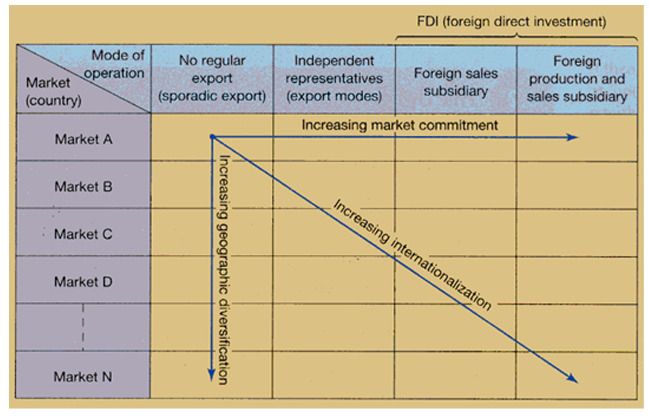Culture plays an important role in life of people as it is closely associated with them. It is very necessary to understand what a culture requires and what emotions are attached to it. Different countries follow different culture and because of this some things will be acceptable in some countries whereas the same things will appear to be rude in other countries because of culture difference. People who are culture sensitive will know that the difference between the culture of different people can create differences in their relationship with respect to the way they behave, communicate etc. Hofstede defined culture as “the manner in which the mind is programmed such that it can differentiate the people of one category with those of other.” a culturally sensitive person should try to adapt the culture of other country, their traditions, their way of living, their lifestyle etc. Nowadays people are getting closer Continue reading
International Business
International Business Management deals with the maintenance and development of a multinational operation across national borders, whose manager has the knowledge and the skills to manage and handle cross-cultural processes, stakeholders and business environments in a right way.
Internationalization Concept -The Uppsala Internationalization Model
Internationalization consists of standardized products or service through globally standardized marketing and production processes that target standardized customer needs. Internationalization can be described as the process of increasing involvement in international operations. Another definition denotes internationalization as the process of adapting firms’ operations (strategy, structure, resources, etc) to international environments. Both definitions emphasize the crucial fact that internationalization needs an overall support from the organisation as it is changing the environment to expand in various manners the process mostly consists of macro factors to evolve. The Process of Internationalization Internationalization fundamentally alters the price-setting strategies of domestic economic agents. This is true for agents operating in product markets, factor markets and financial markets. At a micro level, internationalization directly alters pricing behavior by deepening product and factor markets. More potential buyers and sellers imply greater competition and a reduction in excess returns. At a macro level, internationalization also has the Continue reading
Glocalization – Definition, Advantages and Disadvantages
Globalization is one of the most important phenomena of the recent past and of the future. The term “Globalization” describes an ongoing process by which regional economies, societies and cultures are becoming more integrated through a dramatically increased global network of technological, economic, political and cultural exchanges. In specifically economic contexts, the term refers to the integration of national economies into the international economy through trade, particularly trade liberalization or free trade, foreign direct investment, capital flows, migration and the spread of technology. This worldwide phenomenon of interaction among the countries is driven largely by advances in communication, transportation and legal infrastructure as well as the political choice of countries to open cross-border links in international trade and finance. Due to many difficulties that a globalization strategy faces another term has developed in recent years called “Glocalization”. In contrast to globalization, the glocalization strategy, which means thinking globally but acting Continue reading
International Trade and Investment
Today, business is acknowledged to be international and there is a general expectation that this will continue for the foreseeable future. International business may be defined simply as business transactions that take place across national borders. This broad definition includes the very small firm that exports (or imports) a small quantity to only one country, as well as the very large global firm with integrated operations and strategic alliances around the world. Within this broad array, distinctions are often made among different types of international firms, and these distinctions are helpful in understanding a firm’s strategy, organization, and functional decisions (for example, its financial, administrative, marketing, human resource, or operations decisions). One distinction that can be helpful is the distinction between multi-domestic operations, with independent subsidiaries which act essentially as domestic firms, and global operations, with integrated subsidiaries which are closely related and interconnected. These may be thought of as Continue reading
Social Aspects of International Advertising
When we consider International Advertising from the advertiser’s point of view, according to them the primary objective of advertisement is that the product or services which they are offering should be sold in the market. And in achieving the main objective of selling the product or services there are other profound consequences. Advertising puts an influence which is both persuasive and pervasive in nature. Through the selective reinforcement of certain language and values, and social goal, it acts as important force attitudes that underlie behavior not only in the market place, but also in all aspects of life. In an international marketing concern, advertising has an important social influence in a number of ways: many of the international advertising are designed to promote and introduce new products from one market to another. Often this results in sudden change in life-styles, behavior patterns of a society, stimulating for example the adoption Continue reading
Challenges Faced by International Advertising
International marketing can be a tricky business. With the increase in global trade, international companies cannot afford to make costly advertising mistakes if they want to be competitive and profitable. Understanding the language and culture of target markets in foreign countries is one of the keys to successful international advertising. Too many companies, however, have jumped into foreign markets with embarrassing results. Out of their blunders, a whole new industry of translation services has emerged. Faulty Translations The value of understanding the language of a country cannot he overestimated. Translation mistakes are at the heart of many blunders in international advertising. Since a language is more than the sum of its words, a literal, word-by-word dictionary translation seldom works. The following examples prove this point. Otis Engineering Company once displayed a poster at a trade show in Moscow that turned heads. Due to a poor translation of its message, the Continue reading



